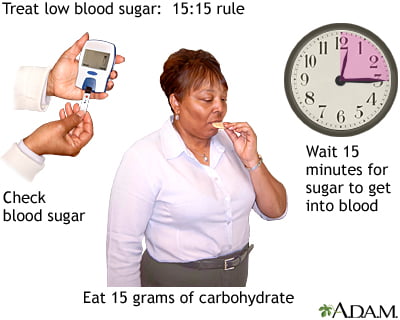How to Tell If Your Sugar Levels Are Too High
There are many ways that you can tell your sugar levels are too high. But not all of them are clear-cut or obvious.
It’s a good idea to keep a close eye on your blood sugar and take steps to prevent swings in glucose levels. This can help you avoid symptoms of high or low blood sugar and keep your diabetes under control.
Increased Thirst
If you have high blood sugar, you may notice increased thirst. This is a common symptom of diabetes, which occurs when your body doesn’t make enough insulin, the hormone that lets your body use glucose from food and other sources to provide energy.
A person who has diabetes will often feel like they can’t quench their thirst, even after they drink. Doctors call this polydipsia, and it’s a sign that your blood sugar levels are too high.
It’s also a sign that your kidneys can’t keep up with the extra glucose they’re trying to absorb from your urine. This can lead to excessive urination, which is referred to as polyuria.

Excessive thirst is one of the first symptoms of diabetes, and it can happen in both type 1 and type 2 diabetics. The autoimmune disease causes your pancreas to stop producing insulin, a key hormone that’s essential to metabolizing glucose.
Because insulin helps control how much sugar is in your blood, the excess glucose builds up and causes your kidneys to work harder. This can lead to frequent urination and water loss, which leads to dehydration.
When a person with diabetes is experiencing severe thirst, they should see their health care provider right away. They should be tested for diabetic ketoacidosis (DKA), which is a life-threatening condition that can cause serious electrolyte imbalances in the blood.
The doctor will check a patient’s blood sugar and urine for signs of DKA and other symptoms. They will also examine the person’s behavior and ask questions about what’s causing their thirst. They may recommend counseling to help the patient become more aware of their drinking habits and how much fluid they need.
Increased Urination

If you are urinating more often than usual, it could be a sign of high blood sugar. This happens because the kidneys cannot effectively filter excess blood sugar, so it is eliminated through urine.
Urination is also one of the earliest symptoms of diabetes, says John Ovalle, MD, Assistant Professor of Medicine at Columbia University Medical Center in New York City. He explains that when your blood sugar levels are high, your kidneys have to work overtime to filter all the extra glucose. This causes dehydration, which in turn stimulates your thirst.
You can tell if your sugar levels are too high by taking an A1C test, which is a blood test that measures the glucose level in your blood over the past two to three months. This test can give you and your doctor a clear picture of your blood sugar level, so they can make the appropriate adjustments to your treatment plan if necessary.
If your urination is excessive, it may be a sign of diabetic kidney disease, which is a serious condition that damages the blood vessels of the kidneys and makes them less efficient at removing waste and excess water from the body, Ovalle says. It can also lead to a urinary tract infection (UTI), which can worsen your diabetes.
In addition, it could be a sign of prostate problems, which are more common in men who are older than age 40. They can cause difficulty starting urination, a weak urine stream, and dribbling at the end of urination.
In addition to checking your A1C, your doctor will ask you about your symptoms and take a physical exam. The doctor will examine your bladder, urethra, and urinary tract to determine the cause of your frequent urination and how to treat it. They might recommend tests such as cystoscopy or urodynamics.
Blurred Vision
Blurred vision can be a sign of a number of different health problems, including diabetes. It’s usually a temporary change that goes away on its own. But if it comes on suddenly and isn’t getting better, see your doctor immediately.
Blurry vision may also be a warning of other serious eye conditions, such as diabetic retinopathy. The condition occurs when elevated blood sugar causes damage to the tiny blood vessels in the retina (the light-sensitive layer of cells on the back of your eye). This leads to fluid leakage and blurred vision.
The short-term blurriness that can result from high blood sugar levels is temporary and usually resolves when glucose gets back into a normal range, generally between 70 and 130 milligrams per deciliter of blood (mg/dL). This usually happens after meals or while adapting to changes in your medications or diabetes care plan.
People with glaucoma, a disease that damages the optic nerves, are also at risk of blurred vision. The condition can cause eye pain and even blindness if left untreated.
This is especially dangerous for pregnant women, who have a higher risk of this condition than others. It’s important to get it checked out, especially if you’re having vision problems and your blood pressure is too high.
If you’re pregnant, it’s a good idea to schedule an exam with your optometrist and general practitioner to check for preeclampsia, which can be fatal for both the mother and her baby. Learn more about this pregnancy complication here.
The long-term changes that can occur as a result of diabetes tend to be progressive, meaning they usually worsen over time. This is the case for most diseases that affect your eyes, including diabetic retinopathy. However, you can lower your chances of developing these eye complications by following a healthy diet and taking the appropriate amount of your medication.
Increased Hunger
Your body breaks down the carbohydrates you eat into glucose, which your muscles and liver use for energy. It also stores extra glucose in your muscles and fat cells for future energy use.
But if you’re not eating enough, your blood sugar levels can rise and trigger hunger pangs. Normally, you should feel full when your body has all the ready-to-use sugar it needs to run its normal functions.
The problem is that your body doesn’t make enough insulin, which transports the sugar into your cells to be used for energy and fuel you up. When your blood sugar is too high, you can’t use the insulin, so the excess sugar just stays floating in your bloodstream, and your brain starts craving food.
This is especially true for people who are diabetic. But people without diabetes can still experience a high-hunger state, too.
You can try eating a meal that includes protein, along with a small amount of healthy fats, and a high-fiber meal that has low carbs to help balance your blood sugar. Getting enough fiber can also keep you feeling full longer, and can lower your cholesterol levels.
Eating slowly and chewing your foods well can also help you avoid feeling hungry. It gives your body more time to release hormones that signal your body that you’re full, explains Minchen. It can also reduce the effects of stress on your appetite, she says. Ultimately, she notes, it’s important to understand the difference between real physical hunger and emotional hunger and to seek medical advice if you are struggling with this issue. This can help prevent serious health issues and complications that could occur if you don’t address it in the right way.
read more : Everything you need to know about high blood pressure
Fatigue
Fatigue is a common symptom of many diseases, but it can also be a sign that you have high blood sugar levels. If you are feeling tired, it is important to see a doctor to identify the cause and treat it.
People often think that fatigue is a normal part of aging, or that it is a result of being busy and overworked, but it is also a symptom of many health conditions. If you are experiencing severe, persistent fatigue, it is a good idea to speak with your doctor and get an accurate diagnosis.
A physician will use a medical history, physical exam and a variety of tests to determine the cause of your fatigue. Some of these tests may include blood work, urine screens and X-rays.
Your provider may also ask about your diet, exercise, sleep, alcohol consumption and other health habits. These are important to consider, as they can influence your overall mood and energy level.
If your doctor believes that high blood sugar is causing your fatigue, they may recommend a treatment plan to reduce your glucose levels. This may involve changing your diet, exercising more, taking medications or reducing your exposure to stressors.
Some medications can help ease fatigue, such as antidepressants and anti-anxiety drugs. However, it is important to talk with your healthcare provider before making any changes or discontinuing any medications that you are taking.
Chronic or severe fatigue is a sign that your blood sugar levels are too high. This can be a symptom of a wide range of health problems, including diabetes, heart disease and cancer. It can also be a symptom of emotional issues like depression or chronic pain.

